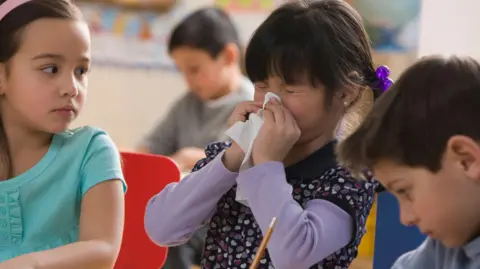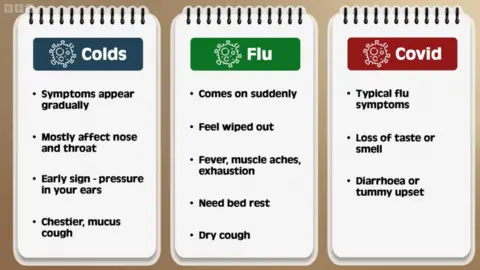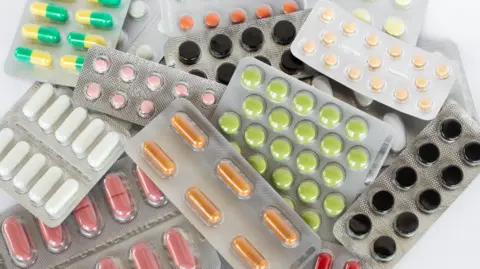Dr Oscar DukeDoctor and BBC Morning Live expert, London
 Getty Images
Getty ImagesChances are you know someone coughing and spluttering – hopefully not directly on you – right now.
There are lots of coughs and colds doing the rounds as autumn draws in.
But why now, how do you know if it’s more than just a cold and how can you avoid the worst.
Medical doctor Dr Oscar Duke, who is also a regular TV presenter including on the BBC’s Morning Live, shares his top tips.
Does colder weather cause colds?
 Getty Images
Getty ImagesResearch on the extent to which cold weather impacts our immune systems remains unclear.
But darker days mean we typically make a beeline for warm, cosy, indoor spaces.
And this environment is perfect for viruses.
It’s also when young children get back together at school after the summer holidays.
School and nursery can be like a petri dish with lots of viruses circulating and they may well bring these germs home with them.
The same applies to freshers in university halls – where mixing together spreads germs, while heavy drinking and partying further weaken the immune system.
Is it a cold, flu or Covid?
 BBC Morning Live
BBC Morning LiveMany of the symptoms between cold, flu and more serious viruses like Covid, overlap.
But there are some clues that might help you identify the exact culprit.
If a cold’s coming on, then it often does so gradually.
It’s going to affect your nose and the back of your throat, while some will get a tickling at the back of the mouth.
Another early warning sign can be a build-up of pressure in the ear.
If the virus spreads further, it can reach your lungs and cause a pesky cough.
Mostly however, these symptoms don’t stop us from carrying on as normal.
The same can’t be said for flu, which typically adds aches, fevers and muscle weakness into the mix.
Flu doesn’t mean you have to go to bed, but it might make you feel that way.
Since the pandemic, Covid has complicated things further, with similar symptons to flu.
But one key Covid-specific identifier can be a loss of smell or taste. Another, as new variants Stratus and Nimbus spike this winter, is a “razor-sharp” sore throat. Diarrhoea is also common.
The recommendation is to stay home and rest and recover.
However, if you have underlying conditions, experience breathlessness or find symptoms don’t ease after three weeks, then you shouldn’t hesitate to seek medical advice.
Can I help make myself better?
 Getty Images
Getty ImagesOur bodies naturally fight viruses and infection, but we can also give it a helping hand with the right medication.
- Paracetamol: Provided you’re okay to take it, this or ibuprofen is the first port of call. Both are really good for helping to bring the fever down and softening any pain that you might have. But remember that lots of cough and cold mixtures include traces of paracetamol, so make sure you’re not accidentally taking too much
- Vitamin C: This is often thought to help defend against colds. But there’s not a huge amount of evidence for this. Unless you’re deficient, focusing on a healthy, balanced diet is far more important
- Vitamin D: A top-up of vitamin D in colder months is recommended by the NHS, because let’s face it, we don’t usually get much sunlight at this time of year in the UK
- Decongestant spray: Sure, they feel great and provide instant relief, but using sprays too often can cause rebound congestion- when your nose becomes dependent and swells without a fix. I suggest using them for no more than four of five days
- Chicken soup: There’s little evidence of the dish fighting viruses directly, but its heat can help warm the back of your throat and soothe some of those symptoms. It’s also a good way to take on extra fluids, with hydration vital as you battle infection.
What about vaccines?
 Getty Images
Getty ImagesIt’s crucial to take the free annual flu jab if you’re offered it.
Eligibility is staggered across the population to prioritise those most at risk.
If you have small children who were two or three on 31 August this year, then they are entitled. Older children will be offered theirs at school.
Find out more and book on the NHS website, or visit your GP.






